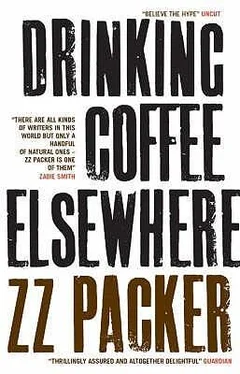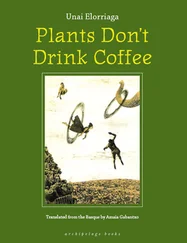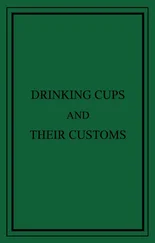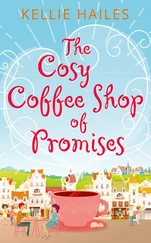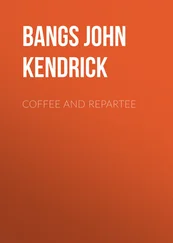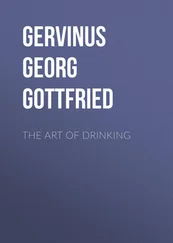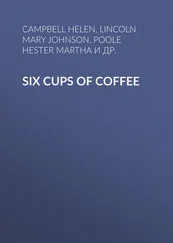“Atoning for one’s wrongs is different from apologizing,” I begin. “One involves words, the other, actions.” I don’t want to dignify all this attention with a further response; don’t want the four men who are now brisk-walking straight toward me to hurt me; don’t want to say anything now that the air around me is silent, listening, now that the sun in my eyes is so hot I feel like crying. I continue, delivering a hurried, jibbering philippic on the nuances between atonement and apology, repentance and remorse. What I’m saying is right and true. Good and important. But I can feel myself getting flustered, can feel the debate judge mouthing Time’s up, see the disbelief and disappointment in the men’s faces, nearly twenty in all, and more turn around to see what the disturbance is about. An Oxford-shirted security guard grabs me by the arm.
“What,” he says, “seems to be the problem, son?”
“Look,” I say finally to him and anyone else who’ll listen, “I’m not here to atone. I’m here to sell birds.”
I finally spot my father, the cages balanced on his shoulders, when the marchless march is pretty much finished. The sky is moving toward dusk, and though there are still speakers on the podium, you’d stick around to listen only if they were your relatives or something. My father and I get pushed along with other people trying to leave.
I don’t bother telling him how security clamped me on the shoulder and sat me down on the curb like a five-year-old and gave me a talking-to, reminding me of the point of the March. I don’t tell him how they fed me warm flatbread and hard honey in a hot plastic tent that served as some sort of headquarters, or how they gave me three bean pies, some pamphlets, and a Koran. I know he can tell how pissed off I am. Anyone can.
And he can see I haven’t sold any birds, and I see he hasn’t either. I wonder if word got around to his section about how security took me out of the crowd for “safety purposes,” but apparently he doesn’t give a shit. Ray Bivens Jr. grabs a passing man by the arm. The man’s T-shirt reads: “Volunteer — Washington D.C.”
“Where’s a good bar?” my father asks. “That’s cheap?”
The man raises his eyebrows and says, “Brotherman, we’re trying to keep away from all that poison. At least for one day.” His voice is smooth and kind, that of a guy from the streets who became a counselor, determined to give back to the community. He smiles. “You think you can make it for one day without the sauce, my brother?”

THE BAR we end up in is called The Haven, and it’s nowhere near where we left the car. Before we left the March, I asked Ray Bivens Jr. how he felt knowing that he’d come nearly seven hundred miles and hadn’t sold a single bird. He didn’t speak to me on the Metro ride to the bar, not even when the birds started embarrassing us on the subway.
The bartender looks at the birds and shakes his head as if his patrons never cease to amuse him.
Even though he’s sitting in the place he loves most, Ray Bivens Jr. still seems mad at me. So do the birds. None of them are speaking, just making noises in their throats as though they’re plotting something. I ask the bartender if the birds are safe outside; if someone will steal them.
“Not if it’s something that needs feeding,” the bartender says.
“Speaking of feeding,” my father says, “I’m going to get some Funyuns. Want any?” He says this more to the bartender than to me, but I shake my head though all I’ve eaten are the bean pies and honey. The bartender spray-guns a 7 Up in a glass for me without my even asking, then resumes conversation with the trio of men at the end of the counter. One man has a goiter. One has processed waves that look like cake frosting. While those two seem to be smiling and arguing at the same time, the third man says nothing, smoking his cigarette as though it’s part of his search for enlightenment.
The smoker ashes his cigarette with a pert tap. “You been at the March, youngblood?”
“Yeah. How’d you know?”
They all laugh, but no one tells me why.
The bartender towels down some beer glasses. “Anybody here go?” When nobody says anything, he says to me, with a knowing wink, “These some shift less niggers up in here!”
There’s general grumbling, and to make them feel less bad about missing the March I say, “I didn’t get all pumped up by the speeches, but in a way I was glad I was there. I think I felt more relieved than anything else.”
“Relieved? What about?” the smoker asks, his voice wise and deep, even though he’s just asking a question.
I try to think. “I don’t know. I’m the only black kid in my class. Like a fucking mascot or something,” I say, surprised that I said the f-word out loud, but shaking my head as though I said words like that every day. “I just get tired of it. You skip it for a day and it feels like a vacation. That’s why I was glad.”
There’s a round of nodding. Not sympathy, just acknowledgment.
“Man,” the guy with the goiter says, “I’m happy to hear that. You got the luxury of feeling tired. Back in the day, before you were born, couldn’t that type of shit happen .”
He seems to be saying less than he means, and looks at me, his eyes piercing, his goiter looking like he’s swallowed a lightbulb. “We the ones fought for you to be in school with the white folks.” He looks behind him, as if checking if any white people are around, though that’s about as likely as Ray Bivens Jr. going sober for good. He lowers his voice so that he almost sounds kind. “We sent you to go spy on them. See how the hell those white folks make all that money! Now you talking ’bout a va cation!”
They all laugh like it’s some sort of secret code that got broken.
“You’ll be all right, youngblood,” says the smoker. “You’ll be all right.”
Just as I begin to realize that they’re humoring me, Ray Bivens Jr. comes blustering in through the door like he lives there. He flashes a wad of money. “Luck,” he says smiling, “is sometimes lucky.”
The trio at the bar high-five one another and laugh in anticipation of free drinks.
“Who,” I say, “did you take that from?”
“Take?” He chucks his thumb toward me as if to say, Get a load of this guy . He counts out the bills so fast that he can’t actually be counting them. “Sold a bird. Rich white dude. Convenient store. I said, ‘I got birds.’ He said, ‘I got money.’ Six hundred bones.”
I’m upset, though I don’t know why. Six hundred bucks. Who in this neighborhood even has six hundred bucks? I lean toward him and whisper, “I bailed you out of jail, remember.”
“Don’t worry,” he says, “I’ll buy you a drink.”
THREE HOURS pass, and my father has beaten all the regulars trying to win money from him at pinochle when a woman appears out of nowhere. Her skin is the color of good scotch. She sits between me and my father, twirls around on her barstool once, and points a red-enameled finger toward the goiter man changing songs on the jukebox. “Play ’Love the One You’re With.’ Isley Brothers.”
“I was going to,” says the Goiter, “just for you.”
She spins around on the barstool again so that she’s facing the bottles lined up on display. “Farrah,” she says and extends a tiny limp hand in my direction. “Farrah Falana.”
“That’s not,” I say, “your real name.”
“Yes it is,” she says dreamily. “Farrah Falana. I was named after that show.”
Now I see that she’s going on fifty. She smiles at me with her mouth closed, and for a moment she looks like a beautiful frog.
Читать дальше
